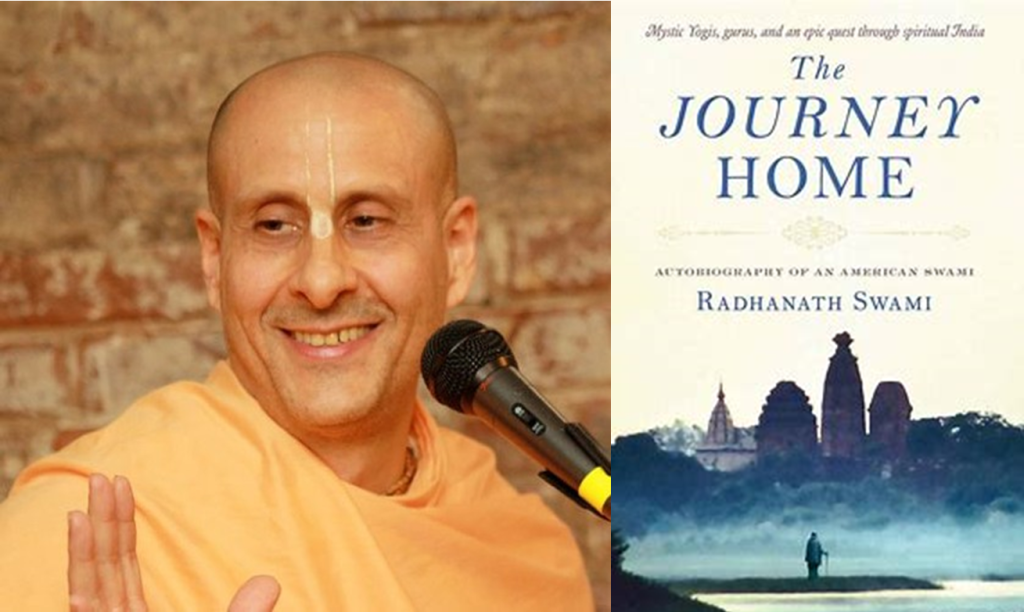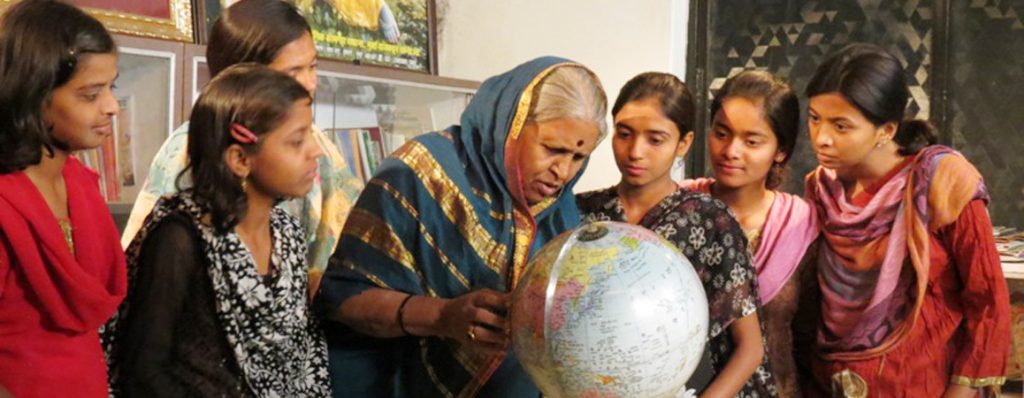Swami Krishna Chaitanya Das of ISKCON introduced me to H.H. Radhanath Swami and his book “The Journey Home“. Within this extraordinary memoir, Radhanath Swami weaves a colorful tapestry of adventure, mysticism, and love. Readers follow Richard Slavin from the suburbs of Chicago to the caves of the Himalayas as he transforms from young seeker to renowned spiritual guide.

The Journey Home is an intimate account of the steps to self awareness and a penetrating glimpse into the heart of mystic traditions and the challenges that all souls must face on the road to inner harmony and a union with the Divine. (https://www.radhanathswami.com)
I came across a video where Radhanath Swami was narrating his conversation, interaction and experience of speaking with Sindhutai Sapkal (Sindhutail Sapkal (sindhutaisapakal.org). I thought of sharing the same here. And I quote —
“I heard of one lady. In brief summary, She was born in a poverty-stricken village in Maharashtra, India. She never really had any education. When she was a little girl and wanted to go to school, her family made her take care of the buffalos.
When she was 9 years old, she was married to a man who was about 30. By the time she was 19, she had 3 sons and she was pregnant.
A mafia type of person who was exploiting the people of the village was especially forcing the women of the village to work really hard and paying them practically nothing and everyone was afraid.
But Sindhutai told the local collector, who was overseeing the police, and that person was stopped from what he was doing, but he was so angry. He went and told Sindhutai’s husband a lie. He said, “You are such a fool. Your wife is having affairs with so many men. In fact, the child that is within her womb is my child and not yours. I have been having sex with her. If you don’t kill the child and kill her, I will kill you.”
So the husband, the girl of 19 years old, he kicked her in the stomach repeatedly to kill her and the child. She laid unconscious. He thought she was dead. So he dragged her to a cowshed where whole herd of cows were being kept, thinking that people will feel that the cows just trampled her and that’s how she died.
So she laid there unconscious and when she woke up, she said, she found one cow standing right above her, protecting her. There were all these buffalos and oxens and cows walking and they would have certainly trampled her, but this cow was keeping everything away from her. And even when the in-laws came to make sure that she was dead, the cow chased them away with her horns and stood over her.
She came to consciousness and gave birth to a baby girl under the cow. And she said she took a rock and cut her umbilical cord. Took about 20 slices to get free from it. And for hours and hours the cow protected, and Sindhutai when she got enough strength, she embraced the cow and promised “as you protected me when I was in great need, I will protect others who are in need.”
It’s a long story, but no one would have her back. Her own family rejected her. Her biological family, because according to their tradition once you are married you can never come back home. A foolish tradition as many are these days.
In order to not to be exploited, she was sleeping in a crematorium with her little baby child. And she would collect wheat that people would put around the dead bodies, and she will mix it with water and cook it on the fires of the dead corpuses.
It became such a depressing life for her. She decided, I don’t want my child to live like this. So she was going to commit suicide. She went to a railway track with her child in her arms and laid waiting for the train to crush them.
But as she was laying there, she heard someone crying in anguish. So she got up and she found an old man, who was crying out. He was crippled, he was very very invalid. And he was crying for some food and water, so she went and begged and got him food and water and she was thinking that the old man was a voice of God she called Krishna. She said it was telling me that I had a higher purpose in life than to commit suicide. I have something to do, something to contribute to this world.
But then later in the day she was sitting in the field wondering what am I going to do? I have nothing, I have no one. How can I help anyone?

She was under a tree and she saw that there was a branch of the tree that a woodsman with an axe had violently cut. The branch was just hanging by a single string. But that branch was giving her and her child shade. So she was thinking, this is the answer. However much I have been beaten down, still I could do something for others.
So she started going and finding homeless, abandoned, orphaned children, and she became their mother, taking care of them. Somehow or other she learned how to sing really nice, and she begged with her singing and she provided for them and somehow or the other kept them safe.
And after sometime people saw what a difference she was making to so many people that they built an orphanage for her. Over the years she said, she’s had about 1500 children, over thousand grand children and she’s made a tremendous difference in her life. All of her children have great education, many are doctors and lawyers and farmers, something she never had.
She has won so many awards internationally for her accomplishments. But then she explained, what the most meaningful and fulfilling thing she ever did in life. Years and years later, after the President of India gave her awards and governors of states and international awards, this really old man came to her orphanage. He was starving. He was sick. He was homeless. He was asking for shelter.
After a few minutes she recognised, this was her ex-husband. The person who tried to murder her maliciously. She said to him, “when you left me to die, I was homeless in rags. Now you are homeless in rags and I have a nice place with so many people. She said the most meaningful thing in her life was she forgave him and she said I will give you shelter, but I am not your wife, I am your mother. And when people would visit the orphanage, she would introduce him. ‘This is my eldest son and sometimes he’s very naughty.’
She told the story; it moved me. So at one place, I shared this story and somehow it was on YouTube and in her orphanage someone showed it to her. So she wanted to meet me. So in Pune I met her and she was with a couple of other people, and we spoke for about an hour together. It was wonderful conversation.
And afterward there was one lady who was sitting next to her, who was just beaming with smiles the whole time, but didn’t say much of anything. And when I was just about to leave Sindhutai said, I want to introduce you to this girl, she’s the one who was born under the cow. She is now a medical doctor, and she is taking charge of one of our orphanages.
And then she said to me, I consider all of the tragedies in my life to have been gifts to empower me, to make a difference to others. She considered it all the grace of God. She said, my life has been a road with many thorns, but I made friends with those thorns and my life became beautiful. And I could give beauty to so many other people’s lives.
That’s one little example of influence without affluence. The power of compassion is far greater than anything that money can do. But when money and knowledge and strength and skills are built on the foundation of that compassion, then not only is our own life enriched beyond our comprehension but we could make such a difference. We can have such an influence in the world. Each and every one of us, whoever we are. Because everyone is so inherently special and nothing and no one can take that away from us as long as we are aware.
To be an instrument of compassion, an instrument of grace, is the true influence beyond affluence.”
अगर तलाश करूँ कोई मिल ही जाएगा
मगर तुम्हारी तरह कौन मुझ को चाहेगा ?…………..बशीर बद्र
agar talaash karuu.n ko.ii mil hii jaa.egaa
magar tumhaarii tarah kaun mujh ko chaahegaa ?…………BASHIR BADR
If I search hard, I may find somebody,
but who will love me like you do?
I came across this amazing motivational poem recited by Amitabh Bachchan in his gorgeous voice for the film “PINK”. तू खुद की खोज में निकल | Tu khud ki khoj mai nikal |Tu chal | Written by Tanveer Ghazi and composed by Shoojit Sircar. — is tremendously meaningful in relation to Sindhutai’s life and ours too. Let’s begin 2024 with this motivation to fly high in the sky on this Makara Sankranti day.
Tu Chal | PINK | Amitabh Bachchan | Shoojit Sircar | Taapsee Pannu (youtube.com)
Lyrics In Hindi
तू ख़ुद की खोज में निकल तू किस लिये हताश है
तू चल तेरे वजूद की समय को भी तलाश है
जो तुझ से लिपटी बेड़ियाँ समझ ले इनको वस्त्र तू
ये बेड़ियाँ पिघाल के बना ले इनको शस्त्र तू
चरित्र जब पवित्र है तो क्यों है ये दशा तेरी
ये पापियों को हक़ नहीं कि लें परीक्षा तेरी
तू खुद की खोज में निकल…
जलाके भस्म कर उसे जो क्रूरता का जाल है
तू आरती की लौ नहीं तू क्रोध की मशाल है
तू ख़ुद की खोज में निकल…
चुनर उड़ा के ध्वज बना गगन भी कँपकँपायेगा
अगर तेरी चुनर गिरी तो इक भू-कम्प आयेगा
तू खुद की खोज में निकल…
===================


What a powerful story. Thanks for sharing this Rajiv
There cannot be a better example than Sindhutai 🙏 on Influence beyond Affluence. You brought it out so aptly.
A truly inspiring real life story; it was made into a movie “Mee Sindhutai Sapkal” which won 4 National Awards in 2011. This great and gritty lady actually lived what is advised in the song from movie “Anurodh”….
तुम बेसहारा हो तो; किसी का सहारा बनो …तुमको अपने आप ही सहारा मिल जाएगा. This is what Influence beyond Affluence is all about….
Goosebumps !!
A very strong story of Sindhutai and hair raising poem.
Thanks for sharing 🙏🙏
What a story! And aptly titled influence without affluence. In a world where money is deemed the only viable currency, love.compassion. Empathy. Prevail far above and beyond.
The depth of life. Everyone comes to the universe with a purpose.